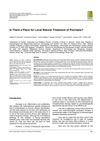 20 citations,
February 2017 in “International Journal of Dermatology”
20 citations,
February 2017 in “International Journal of Dermatology” Platelet-based therapies using a patient's own blood show promise for skin and hair regeneration but require more research for confirmation.
 19 citations,
January 2018 in “Scientific Reports”
19 citations,
January 2018 in “Scientific Reports” Non-immune factors play a significant role in alopecia areata.
 19 citations,
July 2007 in “Dermatologic clinics”
19 citations,
July 2007 in “Dermatologic clinics” Tailor treatments for vitiligo to patient needs for best results.
 18 citations,
April 2022 in “Frontiers in bioengineering and biotechnology”
18 citations,
April 2022 in “Frontiers in bioengineering and biotechnology” Gelatin microspheres with stem cells speed up healing in diabetic wounds.
 18 citations,
January 2013 in “Postepy Dermatologii I Alergologii”
18 citations,
January 2013 in “Postepy Dermatologii I Alergologii” Puberty often causes skin issues like acne and excessive sweating, and treatments require patience as results may vary.
 17 citations,
June 2020 in “Animals”
17 citations,
June 2020 in “Animals” lncRNAs may regulate hair follicle development in Hu sheep.
 17 citations,
August 2019 in “Frontiers in Immunology”
17 citations,
August 2019 in “Frontiers in Immunology” Non-invasive methods show promise for diagnosing skin diseases like psoriasis and lupus but need more research for regular use.
 17 citations,
April 2015 in “Tropical Journal of Pharmaceutical Research”
17 citations,
April 2015 in “Tropical Journal of Pharmaceutical Research” Asiasari Radix et Rhizoma is safe and has potential for new drug development due to its therapeutic properties.
 17 citations,
July 2014 in “Expert Opinion on Biological Therapy”
17 citations,
July 2014 in “Expert Opinion on Biological Therapy” The new method for isolating stem cells from fat is simple and effective, producing cells that grow faster and are better for hair regeneration.
 17 citations,
December 2019 in “Stem Cells International”
17 citations,
December 2019 in “Stem Cells International” Bioactive molecules show promise for improving skin repair and regeneration by overcoming current challenges with further research.
 16 citations,
March 2018 in “Seminars in Oncology”
16 citations,
March 2018 in “Seminars in Oncology” The document concludes that pregnancy and cancer share immune evasion tactics, but more research is needed before using checkpoint blockade immunotherapy in pregnant cancer patients to avoid harm to the placenta.
 16 citations,
September 2018 in “Clinical Biochemistry”
16 citations,
September 2018 in “Clinical Biochemistry” The document concludes that more research is needed to fully understand the causes of PCOS.
 15 citations,
June 2018 in “Food Reviews International”
15 citations,
June 2018 in “Food Reviews International” Pumpkin seed oil may improve prostate health, bladder control, and hair growth in men.
 15 citations,
July 2015 in “Journal of Essential Oil Bearing Plants”
15 citations,
July 2015 in “Journal of Essential Oil Bearing Plants” Thuja orientalis and Thuja occidentalis essential oils have medicinal properties useful for developing treatments with antimicrobial and bioactive effects.
 15 citations,
May 2018 in “Open Access Macedonian Journal of Medical Sciences”
15 citations,
May 2018 in “Open Access Macedonian Journal of Medical Sciences” Propolis and aloe vera ointment effectively treats mild to moderate psoriasis.
 15 citations,
January 2018 in “Biomedical Reports”
15 citations,
January 2018 in “Biomedical Reports” Exosomes are important for skin health and could help diagnose and treat skin diseases.
 15 citations,
October 2017 in “Journal of Cosmetic and Laser Therapy”
15 citations,
October 2017 in “Journal of Cosmetic and Laser Therapy” FDA-cleared devices may help treat hair loss, but more research needed; consult dermatologist before use.
 14 citations,
May 2021 in “Marine Drugs”
14 citations,
May 2021 in “Marine Drugs” PDRN, derived from salmon sperm, shows promise in healing wounds, reducing inflammation, and regenerating tissues, but more research is needed to understand its mechanisms and improve its use.
 14 citations,
June 2021 in “Expert Opinion on Therapeutic Patents”
14 citations,
June 2021 in “Expert Opinion on Therapeutic Patents” New patents show progress in developing drugs targeting the Wnt pathway for diseases like cancer and hair loss.
 14 citations,
October 2020 in “Natural Products and Bioprospecting”
14 citations,
October 2020 in “Natural Products and Bioprospecting” Various treatments, including FDA-approved drugs, natural products, and oral supplements, can help with hair loss, but a patient's medical history and potential allergies should be considered when choosing a treatment.
 14 citations,
October 2018 in “Brain Research Bulletin”
14 citations,
October 2018 in “Brain Research Bulletin” Exosomes help nerve fibers grow by affecting specific cell signaling pathways.
 14 citations,
September 2015 in “Expert Opinion on Therapeutic Targets”
14 citations,
September 2015 in “Expert Opinion on Therapeutic Targets” The conclusion is that while oral contraceptive pills are effective for PCOS-related high androgen levels, new treatments with fewer side effects are needed.
 14 citations,
January 2015 in “Genetics and molecular research”
14 citations,
January 2015 in “Genetics and molecular research” The transition from growth to regression in Cashmere goat hair follicles involves changes in expression of genes related to keratin and cell differentiation.
 14 citations,
April 2005 in “Experimental Dermatology”
14 citations,
April 2005 in “Experimental Dermatology” Stressed fibroblasts greatly increase melanin production in hair, skin, and eye cells, mainly due to a growth factor called bFGF.
 13 citations,
October 2017 in “Bioscience, Biotechnology, and Biochemistry”
13 citations,
October 2017 in “Bioscience, Biotechnology, and Biochemistry” Centella asiatica extract may help promote hair growth by blocking a specific cell signaling pathway.
 13 citations,
October 2010 in “Pharmacogenomics”
13 citations,
October 2010 in “Pharmacogenomics” Researchers found that most genes affecting drug responses are not fully covered by commercial SNP chips, suggesting the need for more comprehensive tools to optimize drug selection based on genetics.
 13 citations,
April 2022 in “Frontiers in oncology”
13 citations,
April 2022 in “Frontiers in oncology” Melanoma development can be linked to the breakdown of skin's melanin-producing units.
 13 citations,
December 2019 in “Nutrients”
13 citations,
December 2019 in “Nutrients” An apple-based supplement was found to stimulate hair protein production, which may help with hair growth.
 12 citations,
June 2017 in “Cell Cycle”
12 citations,
June 2017 in “Cell Cycle” Minoxidil foam helps hair growth by increasing good proteins and decreasing bad pathways in men with hair loss.
 11 citations,
June 2022 in “Frontiers in immunology”
11 citations,
June 2022 in “Frontiers in immunology” New protein changes may be involved in the immune attack on hair follicles in alopecia areata.






























